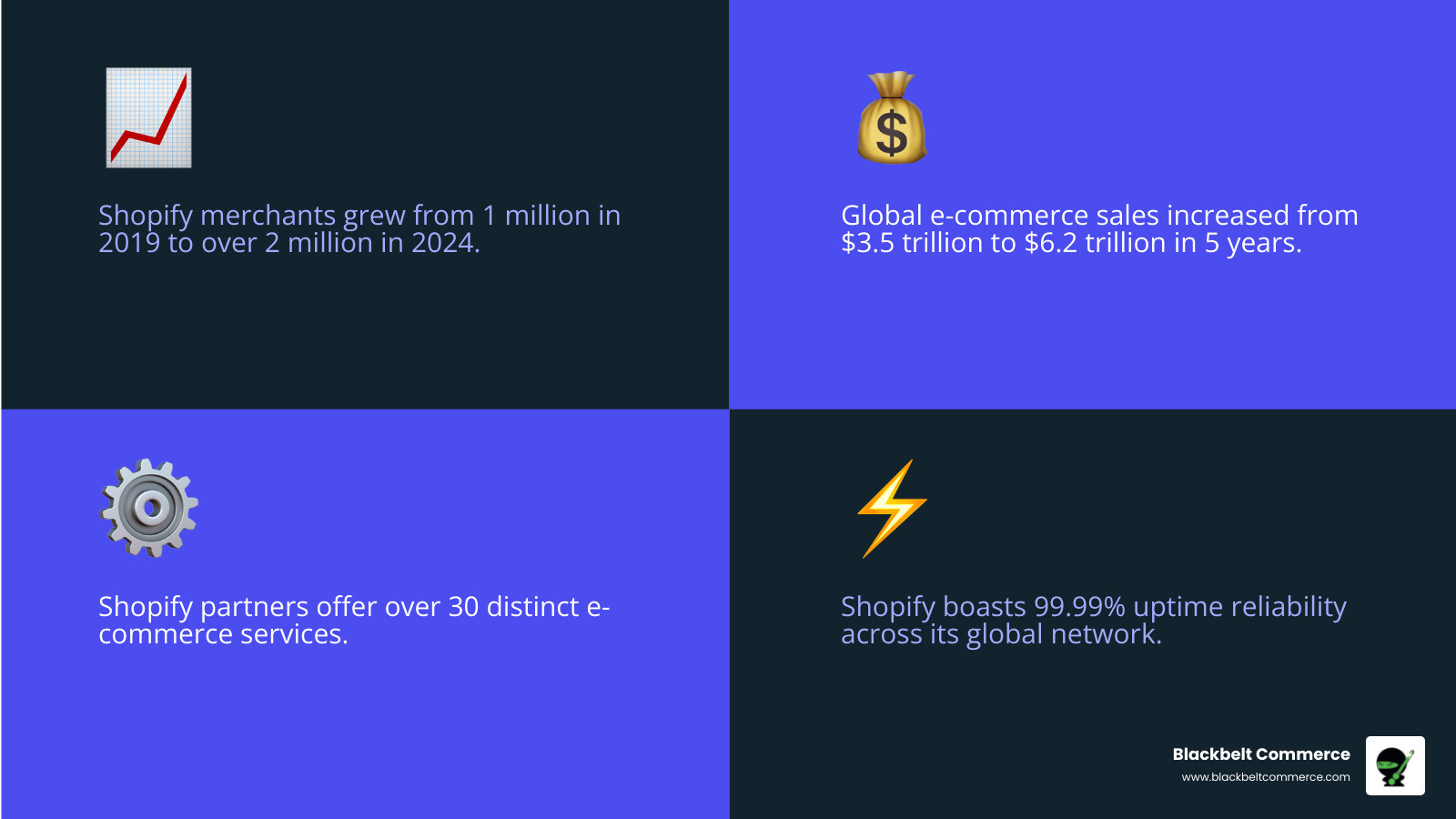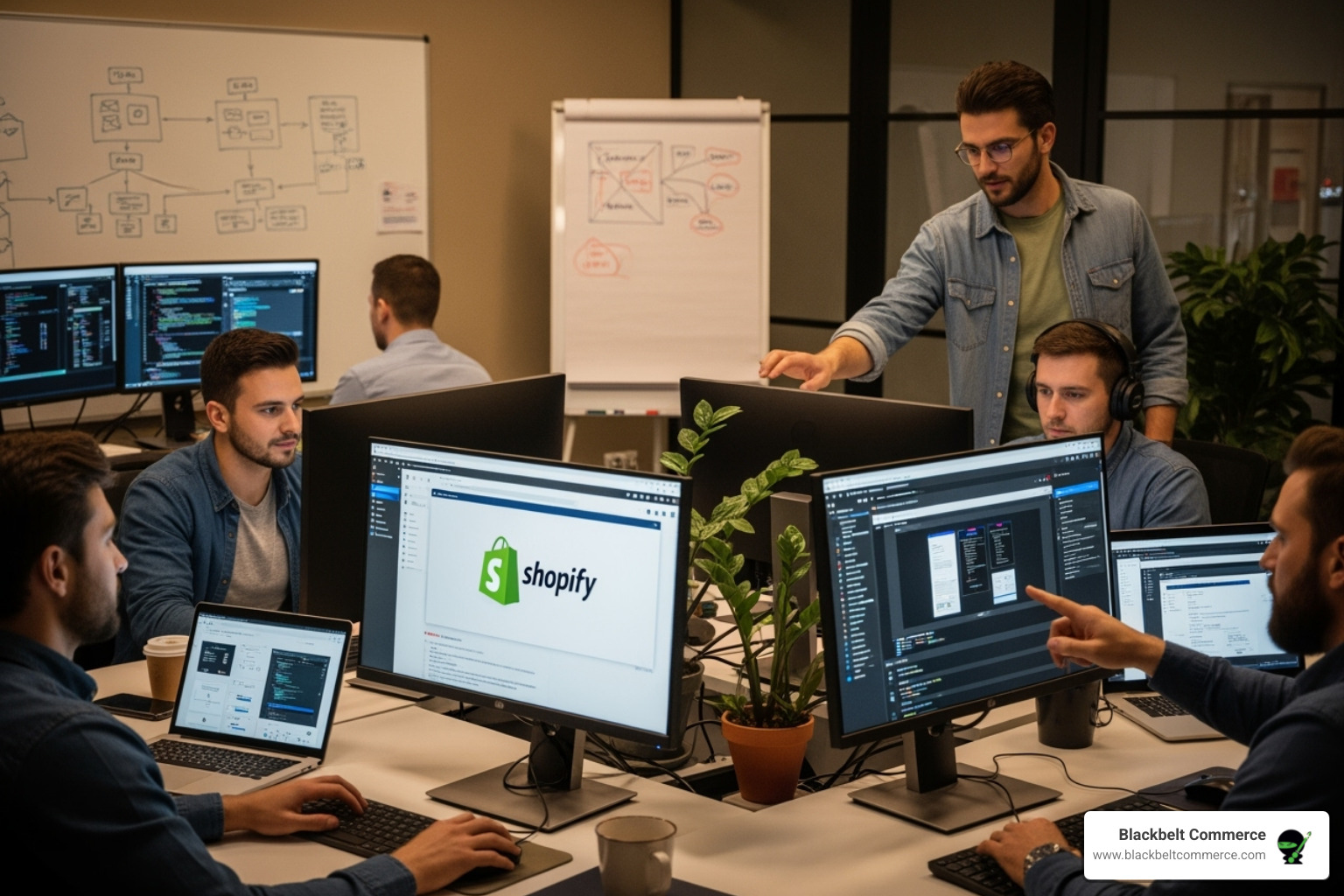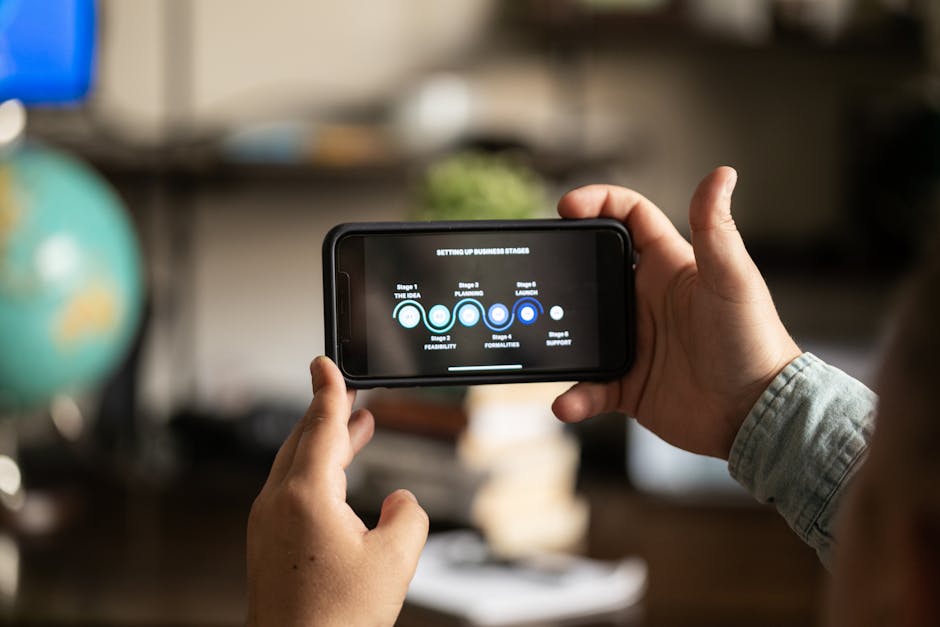Why Finding the Right Shopify Development Firm Is Critical for Your Success
A Shopify development firm transforms your e-commerce vision into a high-converting online store. With Shopify powering 10% of all US commerce and boasting 99.99% uptime, choosing the right partner is crucial to tap into this platform’s potential.
Key services a Shopify development firm provides:
- Custom store design and development – Custom themes and user experiences
- Platform migration – Seamless transition from other e-commerce platforms
- App integration and custom solutions – Extending functionality with third-party tools
- Shopify Plus upgrades – Enterprise-level features for scaling businesses
- Ongoing optimization and support – Performance improvements and maintenance
The challenge isn’t finding a firm—with over 3,905 partners in Shopify’s directory—but the right one. You need a partner who understands your goals, has proven expertise, and can deliver conversion-focused solutions to help you compete.
As Cesar A Beltran, Founder and CEO of Blackbelt Commerce with over 15 years of e-commerce experience, I’ve helped 1000+ businesses choose and work with the right Shopify development firm to achieve measurable online success. This guide will walk you through the exact process for vetting partners and building your e-commerce dream team.

What Can a Shopify Development Firm Do for You?
Think of a Shopify development firm as your strategic partner for e-commerce success. More than just coders, they are architects, designers, and strategists who build and optimize your online store for maximum impact. They offer comprehensive services to help your business launch, scale, and thrive.
Shopify partners offer over 30 services, covering every e-commerce need from simple tweaks to complex enterprise solutions. Their goal is to turn your concept into conversions by building a beautiful and effective online store. A Shopify development firm builds your primary sales channel—your online store—ensuring it’s robust, user-friendly, and optimized to connect products with customers.
Custom Store & Theme Development
Your online store is your brand’s digital flagship, needing to reflect your identity and guide customers to purchase. A skilled Shopify development firm creates bespoke designs that are both visually appealing and highly functional.
We focus on a mobile-first approach, ensuring your store performs flawlessly on any device, as most online shopping happens on smartphones. Our expertise in E-commerce Web Design goes beyond aesthetics; we craft the user experience (UX) for intuitive navigation and effortless checkout. This includes developing custom Shopify Themes with unique layouts and features that off-the-shelf themes can’t match, ensuring the design directly contributes to your bottom line.
App Integration & Custom Solutions
Shopify’s power is its extensibility. A Shopify development firm open ups its potential by integrating third-party apps for inventory, customer service, and more, or by building custom apps for unique business needs.
This can involve complex API integrations to connect your Shopify store with ERP or CRM systems. For ultimate flexibility, some firms specialize in headless commerce using technologies like Shopify Hydrogen/Oxygen. This separates the front-end from the back-end, allowing for unparalleled UI/UX customization, which is valuable for larger brands with complex customer journeys.
Store Migration & Shopify Plus Upgrades
Outgrowing your current platform? A Shopify development firm can manage a seamless transition to Shopify, ensuring data integrity and minimal downtime. They handle the complex process of migrating products, customer data, and order history from platforms like Magento, BigCommerce, or WooCommerce.
For growing or enterprise businesses, upgrading to Shopify Plus is a game-changer. A specialized firm can open up advanced features like customizable checkouts, automation tools, and dedicated support. This service is for high-volume businesses needing a platform that can scale with their success, handling peak sales that can exceed $1M/hour.
Optimization & Ongoing Support
Launching your store is just the start. Continuous optimization and support are essential for success. A Shopify development firm provides Conversion Rate Optimization (CRO), analyzing user behavior to turn more visitors into customers through A/B testing, UX/UI improvements, and streamlined checkouts.
Performance and speed are paramount for UX and SEO, as a 1-second faster load time can boost conversions by 7%. Firms improve site speed and offer maintenance retainers to keep your store secure, updated, and bug-free. They manage Shopify’s 99.99% uptime and ensure custom code functions perfectly, making these partnerships vital for long-term growth.
7 Key Factors for Choosing the Right Shopify Development Firm
Choosing the right Shopify development firm is like finding a business partner. With over 3,905 partners in Shopify’s directory, the challenge is separating the true experts from the dabblers.
This vetting process is for finding a long-term partner who will grow with you and become an extension of your team. Here’s how to spot them:
1. Verify the Expertise of the Shopify Development Firm
Specialization beats generalization every time. You wouldn’t want a heart surgeon who also does brain surgery on weekends – the same logic applies to choosing a Shopify development firm. Look for companies that eat, sleep, and breathe Shopify.
When a team is 100% Shopify-focused, there’s wisdom in that approach. They dedicate all their energy to mastering one platform, so they know every shortcut, potential pitfall, and new feature before it hits the mainstream.
Industry experience matters just as much. A firm that’s built stores for fashion brands understands different challenges than one specializing in B2B manufacturing. Ask about their experience in your specific niche – do they know your customer’s buying journey? Have they solved problems similar to yours?
Don’t forget the technical stuff. Proficiency in Liquid templating, React for modern storefronts, and API integrations isn’t optional – it’s the foundation. Look for Shopify Experts certification, which means Shopify itself has vetted their skills.
2. Scrutinize Their Portfolio and Case Studies
A portfolio tells a story. Dig into their Shopify Case Studies like you’re investigating a potential business partner (because you are).
Look for diversity in their work. Can they handle both minimalist designs and complex, feature-rich stores? Do their projects show creativity while maintaining strong functionality? More importantly, can they prove their impact with real numbers?

The magic happens when you see quantifiable results. Look for proof of impact, like a 614.85% increase in organic traffic, sales boosted from $850K to over $3M, a 34% sales increase in 6 months, or a 48% improvement in site speed. These aren’t just vanity metrics—they’re proof that the firm understands what drives e-commerce success.
3. Read Client Reviews and Testimonials
Real client feedback is worth its weight in gold. Beyond star ratings, dive into the detailed comments on platforms like Clutch, GoodFirms, and Google Reviews.
Pay attention to consistency in the feedback. Do multiple clients praise their communication skills? Do they consistently deliver on time? How do they handle challenges when things don’t go according to plan? Video testimonials can be particularly revealing – there’s something about hearing directly from satisfied clients that written reviews can’t quite capture.
Watch for red flags too. Recurring complaints about missed deadlines, poor communication, or surprise costs should make you pause. A high client retention rate speaks volumes about their ability to maintain long-term relationships.
4. Understand Their Development Process
Transparency in process equals peace of mind for you. Ask potential firms about their methodology. Agile often works better for e-commerce projects than the more structured Waterfall method because it allows for frequent feedback and course corrections.
Find out about their project management tools. Whether they use Jira, Asana, or Trello matters less than how they use these tools to keep you informed. A good firm will detail their workflow with phases like deep-dive analysis, human-centered design, and implementation with regular Scrum reviews.
You should never be left wondering what’s happening with your project. The right firm will have clear processes for incorporating your feedback and keeping you involved at every crucial decision point.
5. Evaluate Communication and Project Management
Great communication can make or break your project. From your very first interaction, pay attention to how responsive they are. Do they assign a dedicated project manager who becomes your go-to person? This single point of contact eliminates confusion and ensures nothing falls through the cracks.
Time zones matter more than you might think. If you’re running a business that spans Los Angeles to New York, having a development team that’s awake when you are can significantly improve collaboration and speed up decision-making.
Beyond the logistics, consider the cultural fit. Do their values align with yours? Do they seem genuinely excited about your business goals, or are they just going through the motions? Clear, regular reporting on progress and challenges builds trust and keeps everyone aligned.
6. Discuss Pricing Models and Costs with Your Shopify Development Firm
Understanding the money side upfront prevents headaches later. Most Shopify development firms work with three main pricing models: hourly rates (great for ongoing support and undefined scopes), fixed-price projects (perfect when you know exactly what you want), and retainer models (ideal for long-term partnerships with continuous optimization).
Hourly rates can vary dramatically depending on the firm’s location, expertise, and track record. But here’s the thing: focus on value over price. A slightly higher investment in a proven firm often pays for itself through better conversion rates, fewer revisions, and faster project completion.
Ask about their scope definition process. The best firms will spend time understanding your needs before throwing out numbers. They might offer flexible options like “Shopify small tasks” or bulk hour packages for ongoing needs.
7. Check Their Shopify Partner Status
Shopify’s partner program is like a quality seal – it means the platform itself has vetted these firms. Partners get access to exclusive training, early feature releases, and specialized support that can directly benefit your project.
Understanding the partner tiers helps you match the right expertise to your needs. Shopify Partners handle general services like store setup and theme customization. Shopify Experts have proven their skills with significant client success and positive reviews. Shopify Plus Partners specialize in enterprise-level solutions for high-volume merchants.
| Tier | Description | Benefits |
|---|---|---|
| Shopify Partner | General partners offering services like store setup, theme customization, app development, and marketing. | Access to development stores, training, resources, and listing in the Shopify Partner Directory. |
| Shopify Expert | A designation within the Partner program for firms that have demonstrated a high level of proficiency and client success, often with a significant number of positive reviews. | Higher visibility in the Expert Marketplace, recognition of proven expertise. |
| Shopify Plus Partner | Specialized partners with proven experience delivering enterprise-level solutions for high-volume merchants using Shopify Plus. | Deep expertise in complex migrations, integrations, and large-scale custom development; access to exclusive Shopify Plus tools and support. |
You can verify any firm’s status through the Official Shopify Partner Directory. If they’re not listed, that’s a conversation worth having – there might be a good reason, but you deserve to know what it is.
The Typical Engagement Process: From First Call to Launch Day
Working with a Shopify development firm should feel like a partnership, not a mystery. At Blackbelt Commerce, we’ve refined our process over 15 years and 1000+ projects to make your journey from concept to launch as smooth as possible. Think of it as a roadmap where you’re never left wondering “What happens next?”
The beauty of a structured process is that it removes the guesswork. You’ll know exactly what to expect at each stage, when you’ll see results, and how your input shapes the final outcome. This collaborative workflow ensures we’re building exactly what your business needs, not just what looks pretty.

Step 1: Findy & Strategy
Everything starts with understanding your vision. Our initial consultation isn’t just a sales call – it’s a deep dive into what makes your business tick. We want to know your goals, your challenges, and that ambitious vision you have for your online store.
During this phase, we roll up our sleeves for thorough requirement gathering. We explore your business model, dig into your target audience, and map out your competitive landscape. Who are you competing against? What are they doing right? More importantly, what opportunities are they missing?
The competitor analysis often reveals surprising insights. Maybe your competitors are all using the same boring checkout flow, or perhaps there’s a gap in mobile experience you can exploit. We document everything in a crystal-clear project scope that outlines deliverables, timelines, and the key performance indicators that will measure success.
By the end of this step, we’re not just aligned – we’re excited about the same vision.
Step 2: Design & UX/UI
Now comes the fun part – bringing your vision to life visually. We start with wireframing, which is basically the skeleton of your store. Think of it as the blueprint before the beautiful house gets built. These wireframes show where everything goes without getting distracted by colors or fonts.
Next, we create mockups – those gorgeous static images that make you go “Wow, that’s exactly what I wanted!” But we don’t stop there. Our interactive prototypes let you actually click through your future store, experiencing the flow before we write a single line of code.
User journey mapping is where we get strategic about the customer experience. We trace every possible path a customer might take, from their first visit to that satisfying “Order Complete” page. Every click should feel natural and guide them closer to a purchase.
Throughout this phase, brand alignment is our north star. Your store needs to feel authentically you – whether you’re selling handcrafted jewelry or enterprise software. The design should make your customers think “This company really gets me.”
Step 3: Development & Integration
With your approved designs in hand, our developers work their magic. Front-end coding creates everything your customers see and touch – the beautiful interfaces, smooth animations, and intuitive navigation. Meanwhile, back-end development builds the powerful engine that runs everything behind the scenes.
App integrations are where your store gets its superpowers. We connect payment gateways, shipping providers, inventory management systems, and marketing tools. If you’re migrating from another platform, data migration ensures every product, customer record, and order history makes the journey safely to your new Shopify home.
This is also where custom features come to life. Maybe you need a unique product configurator or a special wholesale portal. Whatever makes your business unique, we build it into your store’s DNA.
The development phase is iterative – we show you progress regularly and incorporate your feedback. No surprises, no “trust us, it’ll be great” moments.
Step 4: Testing & Quality Assurance
Before your store meets the world, it gets put through its paces. Our functionality testing is thorough – every button gets clicked, every form gets filled, every checkout flow gets completed. We’re looking for anything that might frustrate your future customers.
Cross-browser compatibility testing ensures your store looks pixel-perfect whether someone visits on Chrome, Safari, Firefox, or that one person still using Internet Explorer (yes, they exist). Performance checks guarantee fast loading times because nobody waits for slow websites anymore.
When we find bugs – and we always find a few – our bug fixing process is swift and systematic. We document everything, fix it, then test again. This iterative approach means your store launches rock-solid and ready for real customers.
Step 5: Launch & Post-Launch Support
Launch day! After final checks and your thumbs up, we carefully deploy your new store to your live domain. We time this strategically to minimize any disruption to your business.
But here’s where many agencies disappear – we stick around. Client training ensures you and your team feel confident managing your new store. We cover everything from adding products to reading analytics reports.
Our warranty period covers any immediate hiccups because even the best-tested stores sometimes surprise us in the real world. For long-term success, our ongoing maintenance retainers keep your store secure, fast, and evolving with your business needs.
Think of launch day not as the end, but as the beginning of a partnership focused on your continued growth and success.
Frequently Asked Questions about Shopify Development
When you’re considering working with a Shopify development firm, certain questions naturally come up. We’ve been in this business long enough to know exactly what keeps business owners up at night when they’re thinking about their e-commerce future. Let me answer the most common ones we hear.
What’s the difference between a Shopify Expert and a Shopify Plus Partner?
This is probably the question we get asked most often, and honestly, it’s a great one because the distinction really matters for your business.
Think of a Shopify Expert as your go-to professional for most Shopify needs. They’ve proven themselves capable of handling store setups, theme customizations, app integrations, and the day-to-day development tasks that keep most businesses humming along nicely. You’ll find them listed in the Shopify Expert Marketplace, and they’re perfect for small to medium-sized businesses looking for solid, reliable Shopify work.
Now, a Shopify Plus Partner? That’s a whole different level. These are the firms you call when you’re playing in the big leagues. We’re talking about enterprise-level expertise here – the kind of deep knowledge you need when you’re handling millions in sales or dealing with complex integrations that would make most developers break out in a cold sweat.
Shopify Plus Partners have exclusive access to advanced features and tools that regular partners don’t get. They’ve proven they can handle complex migrations, custom integrations with systems like ERP and CRM platforms, and the scalability challenges that come with rapid growth.
The bottom line? If you’re a growing business with standard needs, a Shopify Expert is perfect. But if you’re enterprise-level or planning to get there fast, you want a Shopify Plus Partner in your corner.
Can a development firm also handle my store’s SEO?
Absolutely, and I’m glad you asked! This is actually one of those “two birds, one stone” situations that can save you a lot of headaches down the road.
Many Shopify development firms, including ourselves, offer comprehensive SEO services because we understand a fundamental truth: the most beautiful store in the world won’t generate a single sale if customers can’t find it. It’s like building a stunning storefront in the middle of a desert – what’s the point?
When we handle both development and SEO, we can build search optimization right into your store’s foundation. We’re talking about technical SEO work like optimizing your site’s code structure, ensuring lightning-fast load times, and making sure everything works perfectly on mobile devices. Then there’s the on-page optimization – crafting those compelling product descriptions and meta tags that help search engines understand what you’re selling.
But it goes deeper than that. We develop content strategies that attract your ideal customers through valuable blog posts and resources. We also work on link building to boost your store’s authority in Google’s eyes. Some firms have helped clients achieve over 600% increases in organic traffic, which translates directly into more sales.
The beauty of working with a Shopify development firm that also handles Shopify SEO is the seamless integration. Your store gets built with search optimization baked in from day one, rather than trying to retrofit SEO later – which is always more expensive and less effective.
How long does it take to build a custom Shopify store?
Ah, the million-dollar question! I wish I could give you a simple answer, but the truth is, it depends on several key factors that can dramatically impact your timeline.
The complexity of your design plays a huge role. If you want something that looks like every other store out there with minor tweaks, we can move pretty quickly. But if you’re envisioning highly custom designs with unique interactive elements and animations, that’s going to take more time – and honestly, it’s usually worth the wait.
Your product catalog size matters too. Setting up a store with 50 products is very different from organizing thousands of products with multiple variants, custom attributes, and complex categorization systems.
Then there are custom features and integrations. Need to connect with your existing ERP system? Want custom app development? Planning complex third-party API integrations? Each of these adds layers of complexity that extend the timeline but often provide tremendous value.
Here’s what we typically see: Basic custom stores for smaller businesses with standard features usually take 4-8 weeks. These are perfect for businesses that need a professional, conversion-optimized store without a lot of bells and whistles.
Medium-complexity stores with custom themes, moderate product catalogs, and key integrations typically require 8-16 weeks. This is the sweet spot for many growing businesses.
Complex, enterprise-level stores are where things get interesting. When you need extensive custom development, headless commerce solutions, numerous integrations, and enterprise-level scalability, you’re looking at 3 to 6 months or even longer. But remember, these aren’t just stores – they’re comprehensive e-commerce platforms built to handle serious growth.
The key is that any reputable Shopify development firm will give you a detailed timeline during the findy phase, once they understand exactly what you need. And here’s a pro tip: your responsiveness with feedback and content makes a huge difference in keeping everything on track.
Conclusion: Build Your E-commerce Future with the Right Partner
Finding the perfect Shopify development firm isn’t just another business decision – it’s choosing the partner who will help shape your digital future. Throughout this guide, we’ve walked through the seven key factors that separate exceptional firms from the rest: verifying expertise, scrutinizing portfolios, reading authentic reviews, understanding development processes, evaluating communication styles, discussing pricing transparently, and checking official Shopify partner status.
The right partnership goes far beyond building a beautiful website. You’re investing in a conversion-focused online presence that scales with your ambitions, adapts to market changes, and consistently drives revenue growth. When you choose wisely, you’re not just getting developers – you’re gaining strategic allies who understand your industry, anticipate challenges, and celebrate your wins alongside you.
The long-term value of this partnership becomes clear as your business evolves. Your chosen firm becomes intimately familiar with your brand, your customers, and your goals. They’re there for the midnight launch preparations, the seasonal traffic spikes, and the exciting moments when you’re ready to expand into new markets or product lines.
At Blackbelt Commerce, we’ve built our reputation on being that trusted partner for businesses ready to take their e-commerce seriously. Our fully customized, conversion-focused Shopify solutions have helped companies in Los Angeles, New York, and beyond transform their online presence into powerful revenue engines. We specialize in the complex, large-scale projects that require both technical expertise and strategic thinking.
Your success story starts with the right partnership. Whether you’re launching your first store or scaling an enterprise-level operation, the firm you choose today will influence your trajectory for years to come. We’re here to empower your brand, optimize your conversions, and help you thrive in an increasingly competitive marketplace.
Ready to build something extraordinary together?

